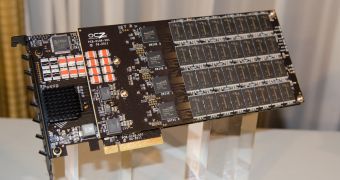At this year's Computex fair, OCZ has presented its fastest enterprise PCI Express SSD to date, the Z-Drive R4 88, which was used by the company in order to build the first system capable of exceeding the 1 million IOPS barrier.
OCZ's latest drive is powered by no less than eight enterprise-class SandForce SF-2281 controllers, which are run in an internal RAID-0 mode, and uses a PCI Express x8 interface to communicate with the rest of the system.
When the drive is officially launched, it will be available in two different versions, called the C Series and the R Series
The C Series has less over provisioning and lacks any sort of power loss protection, while the R Series has more NAND put aside as spare space as well as a series of polymer capacitors, for added data safety.
Capacities can range from 460GB to 3.84TB for the C-series drives and between 800GB and 3.2TB for R-series SSDs.
Outside of the Z-Drive R4 88, OCZ has also prepared an R4 84 SSD that features a half height form factor and has lower performance.
In order to demonstrate the power of these drives, OCZ has built a 3U server, together with Colfax, that is powered by multiple Z-Drive R4 88 PCI Express SSDs setup to work in a RAID 0 mode.
This is on display at the company's Computex booth and it managed to achieve more than 1 million IOPS in an Iometer 4KB random read test.
"The Z-Drive R4 enables our data center clients to maximize performance in the industry standard 4K file size, and this achievement with Colfax International demonstrates the raw performance benefits and latency reductions that OCZ PCIe SSDs can deliver over multi-terabyte device densities in a single 3U server," said Ryan Petersen, CEO of OCZ Technology Group.
"We are proud to enable our clients to deliver servers and storage arrays which provide the highest performance, maximum capacity, and lowest latency available to data centers today," concluded the company's rep.
OCZ will start shipping the Z-Drive R4 SSDs in the coming weeks following the Computex event.

 14 DAY TRIAL //
14 DAY TRIAL //